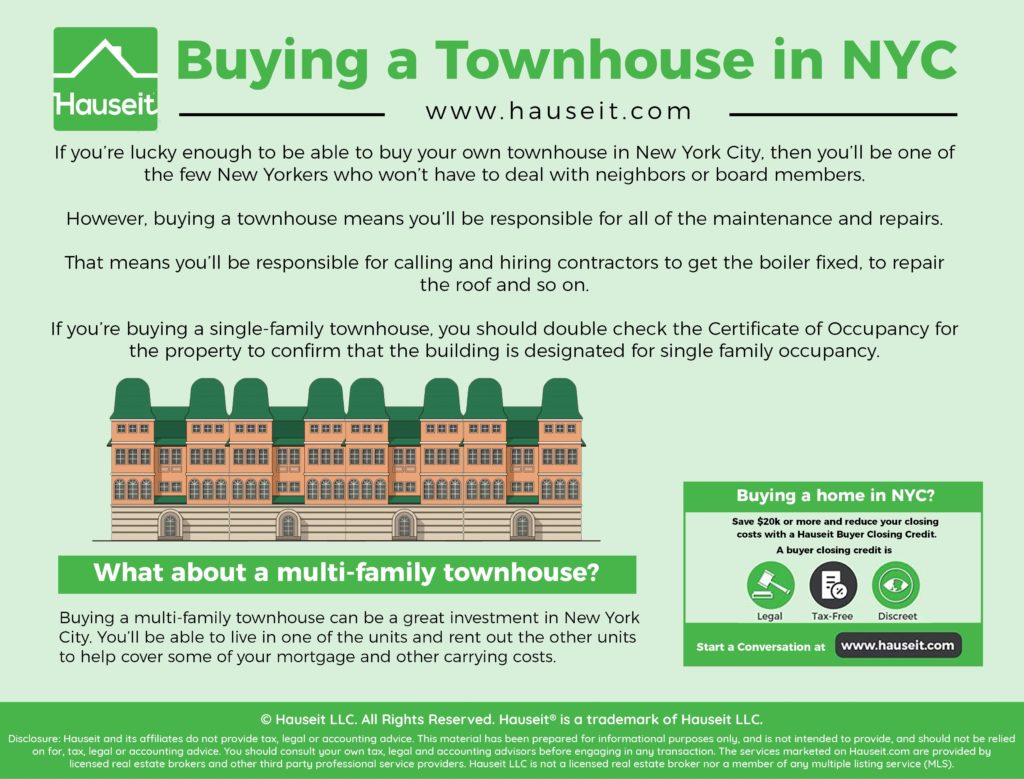Buying a townhouse in NYC can be as rewarding as it is challenging. We’ll discuss the unique benefits and risks of buying a townhouse in NYC, whether it’s a single family home or a multi-family brownstone.
Table of Contents:

If you’re lucky enough to be able to buy your own townhouse in New York City, then you’ll be one of the few New Yorkers who will be able to have no neighbors within your building or board members to deal with.
You’ll never have to worry about internal politics or co-op board fines and rules. Given how small minded some people can be, it’s a great relief to be able to be the master of your own house.
However, buying a townhouse is NYC is akin to buying your typical, free-standing house in the suburbs. You won’t have a managing agent to handle the management of the property so you’ll be responsible for all of the maintenance and repairs.
That means you’ll be responsible for calling and hiring contractors to get the boiler fixed, to repair the roof and so on.
Furthermore, you’ll have to keep a close eye on how fast your property taxes are rising.
In a typical condo or co-op building, the managing agent will hire a law firm specializing in tax certiorari to dispute property taxes on behalf of the entire building.
Buying a townhouse in NYC may mean that you have to hire a tax certiorari firm yourself or go through the complex process yourself.
You should double check the Certificate of Occupancy (C of O or CO) for the property to confirm that the building is designated for single family occupancy.
Remember that a townhouse or brownstone is a style of property and has nothing to do with how many legal units the building consists of.
We recommend buying a townhouse that is already certified for single family occupancy vs looking for a multi-family townhouse to convert to a single family home.
The latter process involves significant amounts of time, money, renovations, patience and changing the building’s Certificate of Occupancy.
Changing a building’s Certificate of Occupancy can open up a whole new can of worms if the building needs to be brought up to code.
For example, applying for a change of CO could mean that you’ll now need to install a sprinkler system across the building which was previously not required.1
1This relatively new 2010 regulation mandates sprinkler systems for all attached dwellings regardless of how many families occupy the building. There is an exception for townhouses that are less than three stories tall where you are only changing it from a two to one family building. If this exception applies, you’ll only have to amend the C of O vs get a new one which means no sprinkler system requirements.
Get a 2% Rebate When You Buy
Save thousands on your home purchase with a buyer agent commission rebate from Hauseit
Buying a multi-family townhouse can be a great investment in New York City, especially if you don’t need all of the space in the building. Just be wary of prices as demand for multi-family properties in New York City post the Great Financial Crisis of 2008-2009 has been intense.
However, if you can find a solid multi-family townhouse with good bones and a reasonable price, then you may be in luck. You’ll be able to live in one of the units if you wish, and keep a close eye on your tenants renting out the other units.
Often times smaller, two family townhouses will have an owner’s duplex or triplex at the top and a garden apartment or a duplex on the bottom to rent out.
Regardless of the layout, it’s generally better to live above your tenants so you’re less likely to be disturbed by noise.
Besides the ability to earn rental income from a relatively stable asset vs the stock market, buying investment property in NYC comes with many other great benefits such as the ability to expense almost any costs associated with the property.
For example, assuming a property is fully rented out and you are not living in any of the units, you can deduct the mortgage interest, common charges or home owner association dues, property taxes, property insurance premiums, cost of maintenance and repair against your rental income.
Furthermore, residential property investors can fully depreciate their cost basis over 27.5 years.
A full, in-depth analysis of the tax benefits of buying a multi-family townhouse is beyond the scope of this article. However, you should read our guide on NYC real estate taxes and consult your tax accountant to learn more.
Save 2% On Your Home Purchase
Save thousands on your home purchase with a buyer agent commission rebate from Hauseit
It’s been quite popular recently for investors to purchase large, single or multi-family townhouses in order to convert them to condos for re-sale. The rationale for doing this is because of the arbitrage in price per square foot valuation that exists between townhouses that are owned by one party and separately owned condominiums.
As a result, you should understand that you’re paying a premium for the convenience of owning a condo vs owning and managing a building yourself. As a condo owner, you have a managing agent who will take care of the property and handle all maintenance and repairs. Plus, you’ll have neighbors to share the burden of property taxes, maintenance costs and governance.
Many older townhouses are structured as co-op buildings with a laughably small number of shareholder tenants. Buying a co-op in a townhouse is not necessarily an easier process than buying a co-op in a larger building, even if it’s a self-managed co-op building. We’ve seen too many examples of 4 or even 2 unit co-op townhouses that require board packages as onerous as larger co-ops with hundreds of units.
Buying a condo unit in a townhouse is no different than buying a condo in a larger building. However, a townhouse that consists of individual condo units is oftentimes a condominium conversion.
Beware of special risks that come with buying a condo in a smaller building with under 10 units, and read our guide on the risks of buying a condominium conversion vs new construction in NYC.
Disclosure: Commissions are not set by law or any Realtor® association or MLS and are fully negotiable. No representation, guarantee or warranty of any kind is made regarding the completeness or accuracy of information provided. Square footage numbers are only estimates and should be independently verified. No legal, tax, financial or accounting advice provided.






